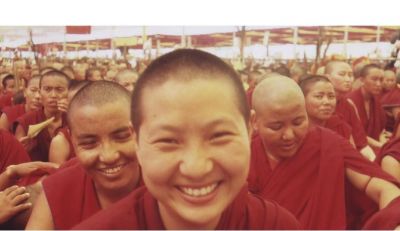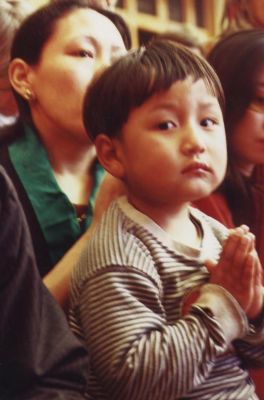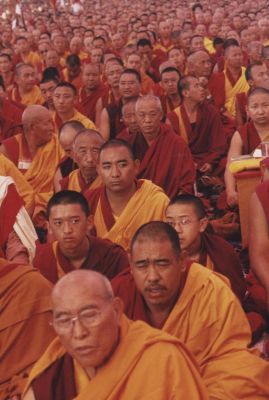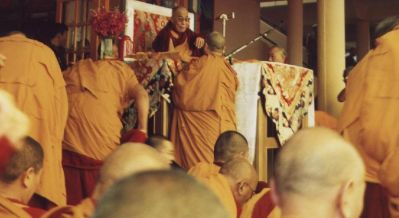We must premise that these are just simple notes from His Holiness teachings listened from english translator and taken by hand and downloaded to the computer immediately after the teaching. Certainly we can not offer you a precise transcription of what His Holiness said in his teachings, who speaks in Tibetan. So please forgive us if there are mistakes or misunderstandings.
Please download the reference text Commentary to the awakening mind by Nagarjuna here.
Luciano Villa e Alessandro Tenzin Villa e Gabriele Erba

Vel Tenzin Ani La smiling toward His Holiness the Dalai Lama
Despite all your duties you find time to come to the teachings. Thank you. Unfortunately the deteriorating situation in China will not allow me to visit Taiwan every other year as planned, so for you coming here is the only possibility to follow the teachings.
I am a Buddhist monk and I have to serve the people through the teachings and that what i am eager to do. Everybody.
… Recitation of the prajnaparamita Sutra.
Almost 600 of you came here to understand Buddhism, Since there are quite a lot people who have been here for the first time I will repeat some aspect that for those who have already been here will be a positive rehearsal. But this is not an excuse to them for sleep. Laughing.

One child is praying
Likewise all other religion is very important that the Dharma, that you are going to practice, will be something understood and studied, you have to make sure to respect every detail, like when you want to be sure that a house is built properly. In particularly you have to be very sure concerning you goal, what specifically you are aiming to. Once you have arrived to know and understand your goal and explored the possibilities to reach it. Understand the chance to reach and develop faith to obtain it. Only at that time you can look for refuge in Buddha, Dharma and Sangha. That is why I aways make a great point in the study to make a ground for Dharma and what does it take to really understand it.
There are some Koreans, some Japanese and also some Vietnamist. Commenting on the presence of people from other religion, the Dalai Lama particularly appreciate their effort. He thinks that those who come here did not came just for faith, but also for investigation.
This means a deep interest towards Buddhism and come together with critical analysis and investigation. Only after one has reached some kind of conclusions, concerning this process, that are useful for himself, he should pursue the practice. At that time his faith and devotion is really stable.
Sometimes since we are young we embrace the religion of our community and thus we do not develop a true interest through critical analysis.
May the three poisons be uprooted and the light of wisdom shines evermore.
I will now go through the first two line of the reference text.
The affliction of the three poisons is mentioned in different traditions like Hinduism, but ignorance, which make our mind believes in an independent and intrinsic existing self, is only a Buddhist idea.
All non-Buddhist philosophies look for the existence of this intrinsic self, concluding that this self exist. They speak about a self with three characteristics: permanent, unitary and independent. The belief in the intrinsic self is considerd by Buddhist as ignorance that must be eliminated.
Although if we all look inside we will feel very clear that our innate view of intrinsic self will make us feel very solid
Similar is the case of other religion (Islam and Christianity), they use different words for this concept, such as soul but they refer to the same thing.

A lot of monks
Also Chinese Tao Cho scholars, if any are present, they can tell that their system subscribed to search they inner self… They speak about selflessness…. no actually the only system speaking of selflessness is Buddhism.
In the first line of the text, we find the three poison such as attachment, which is also present in many other religions, but only Buddhism investigates ignorance as the belief in an independent self.
The three poisons can be uprooted through the shining light of wisdom.
Buddhism try to tackle and overcome afflictions, these can not be overcome by simple faith or compassion. The misconception of self can only be attack by the wisdom that understand the non existence of the intrinsic self.
Like in our ordinary life when we study a language we start with the alphabet. So we confront with ignorance that prevent us to know the alphabet and so we go deep, we study and investigate. We don’t just pray to learn a language but we work hard to learn it. Listening to the explaination of ABC, the mind that knows ABC will rise and it will eradicate the one that does not know it. One has to make effort to overcome ignorance, these efforts will help more than any kind of pray!
So this is not the case of not knowing the alphabet but we are dealing of misconceive of self. Lets take the case of mistaking a colorful rope for a snake, faith will not fight our idea that the snake is there. If we develop love and compassion for the imaginary snake we will not remove the confusion on that object. But wisdom, learning and research will uproot it.
The Buddhist understanding is that all three kind of sufferings along with the afflictions are all rooted in a kind of ignorance or misknowledge. For one to get rid of suffering he has to cultivate understanding, these affliction can be taken away by cultivating knowledge. Cultivating the valid cognition is the ultimate solution for uprooting these afflictions. Problems rise from interrupting the stream of cognition.
The suffering of pain results also from bad karma. Further in the text, it is said that one, through developing wisdom, will find a way to deliver also other form the suffering.
Finally the last line, relates to the bodhisattva way of life, rooted in compassion and love. If Pursued, one eventually develop bodhicitta. With the latter, one aspire to the benefit of others. The aspiration to the welfare of others is generated by compassion and eventually associated with wisdom. The association between these virtues make the mind of bodhicitta complete. The effort to understand emptiness along with wisdom will be able to lead one on the path to enlightenment. And then when one progress further in the stage of accumulation, emptiness will be very much part of the path. And then it is further developed with the path of preparation, then the one of vision, then the one of meditation and finally the path of no more learning to achieve enlightenment to fully eliminate afflictions. At that time when Buddhity is reached, all the phenomena, either conventional and ultimate, will be understood in one single cognitive instant.
Through the development of forceful wisdom rooted in the path, one definitely uproot afflictions. This is what the Sutra is referring to. There is a reference to a line in the Sutra , to the wisdom of crossing to the other side, nothing is more perfect than this. So it is mainly the work of wisdom that is fundamental to the work of love and compassion.
Buddha when he turned the wheel of Dharma, he intended to show that the suffering, that we don’t want, are caused by sensations and its cause. Therefore he explained the four noble truth from the point of view of its causes and effects.
In Buddhism we do not advocate the creation of the entire universe… we think that all sentients being are created by their own cause.
Of all the major religion tradition which have their own sophisticated philosophy, only Buddhism and Jainism do not refer to creation.
The difference between these two Philosophy consist in the fact that Jainism recognize the self, who is subject to the law of cause and effect, as independent and intrinsically existing. While Buddhism refers to an interdependent self, thus not really existing.
That is why Nagarjuna refers to the dependent origination as the essence of BuddhaDharma.
Also in the Sutra of dependent origination it is said that one who see the true meaning of Dharma see the Sughata, the one who went beyond.
And then when Buddha elaborate the twelve sources of dependent origination. He identify ignorance as the main root of all sufferings. He does not leave any space for the self.
When we look at the Buddhist literature of the great vehicle, we find referment to mere dependence which is deeper then just causal dependency. The latter is related only to the cause of phenomena, while the first relates particularly to designation, not only to whatsoever kind of phenomena.
Concerning the first level of dependent origination, one can understand how every happiness and sorrow depends on its causes. When it will be understood that all sentient beings have the same wish to reach happiness, it will naturally arise the wish to make all other beings happy. Consequently it will be realized that either their negative karma and the mental afflictions can be uprooted on the basis of emptiness’ vision. Afterwards it will be clear how it is possible to separate the fundamental nature of mind, which pure, from the mental afflictions. When we will understand the the seed of Buddhity is inside us and we will be blessed by the Bodhicitta. The latter has two aspirations: the first one aspire to enlightenment and the second one aspire to the benefit of others, who are willing to be happy just like us. On this basis we can define the two kind of truth: the conventional truth and the ultimate truth. The first one describes the object as the appear when they are not analyzed, and the second one describes them in terms of dependent origination.
Through practicing method and wisdom one can obtain the two bodies, the body of wisdom which results from the first aspiration mentioned above, and the body of form resulting from the second aspiration.

His Holiness the Dalai Lama
Even emptiness itself is dependent on other conditions. That is why we speak of emptiness of the emptiness.
Usually I tell this at the beginning of every Dharma session but I did not this morning. So I will do it now. In the world there are many religion traditions and all of them have three common questions:
1) What constitute the self?
2) Is there a beginning to the self?
3) Is there an end to self?
In Buddhist tradition there is no independent self. But most of other traditions thinks so.
For Buddhist the self has no beginning nor any end. It is unborn and exist since time with no beginning.
A part from the Vaibashika school, The rest of the Buddhist schools accept that there is no end to the self.
With regards to the question of the possible creation of Buddha: when we speak about two truths we don’t speak of unrelated thing. But we speak about two natures of each and any particular phenomena, and they are related and interdependent. These two namely conventional and ultimate nature have been described above.
Some scholars of quantum physics demonstrated that when we look for the phenomena, eventually we do not find them. The phenomena affects us in a good or bad way but only at a conventional level, if we look for them we do not find them. Non find ability is what we end up finding, that is the reasons why in the scripture we read that the non seen is the ultimate seen.
Things exist and are operational But on a level of ultimate existence then they are not findable.
The question was referring to this morning’s teaching when definite goodness and illumination are the results of valid cognition based on infinite understanding.
QUESTION: Are the Non-Buddhist excluded from the possibility of higher rebirth?
ANSWER: The cause of so-called fortunate birth is the creation of positive karma through a good conduct. So with the teachings of other religion one can definitely obtain higher rebirth. Although it is not possible to have valid cognition. For the latter ancient Buddhist scripture authority is required.
The working of karma can have many different levels. Even the animals seems to handle that quite well… mother birds work to look for a good nest and then look for the best for their children and their group. So to a certain extent they are able to calculate somehow what is good and what is bad. Karma means action and the result following it.
So in this regard it seems important to understand weather valid cognition is relevant or not for rebirth.
Valid cognition is about the true knowledge and ultimate understand of reality. And that has to do also with our daily life. In fact we have to know the detail of everything to be prepared otherwise if we rush on our preparation, there are high chances for our failure.
The reason because we attain education is to be more prepared to life in order to explore the details of situation and try to understand them. This is somehow similar to valid cognition
These days we hear a lot of bankruptcy in the West and this is not because those officials running the banks wish for this, they never wanted it but then something went wrong maybe because of mistake or misconceive or miscalculation…. like for my close friend Bush with regards to his Iraq policy, I don’t agree with it especially with the result; the calculation might have gone wrong or something might have not be seen. The more we recognize and investigate the situation the higher chance we have to reach the goal that is what is intended for valid cognition. If one is driven my misknowledge or wrong calculation does not matter how one can be religious, right and good because he will have very high chances of failure. And that has not only to do with religious things but it has also to do with our day to day life, the more inform we are the better chances we will have.
Now we take up the text of Nagarjuna: The awakening mind
I will not explore the history on Nagarjuna, many of you already know.
Nagarjuna is a well known figure in every kind of Buddhism.
The last part which is a commentary on some stanzas of Nagarjuna text is currently missing.